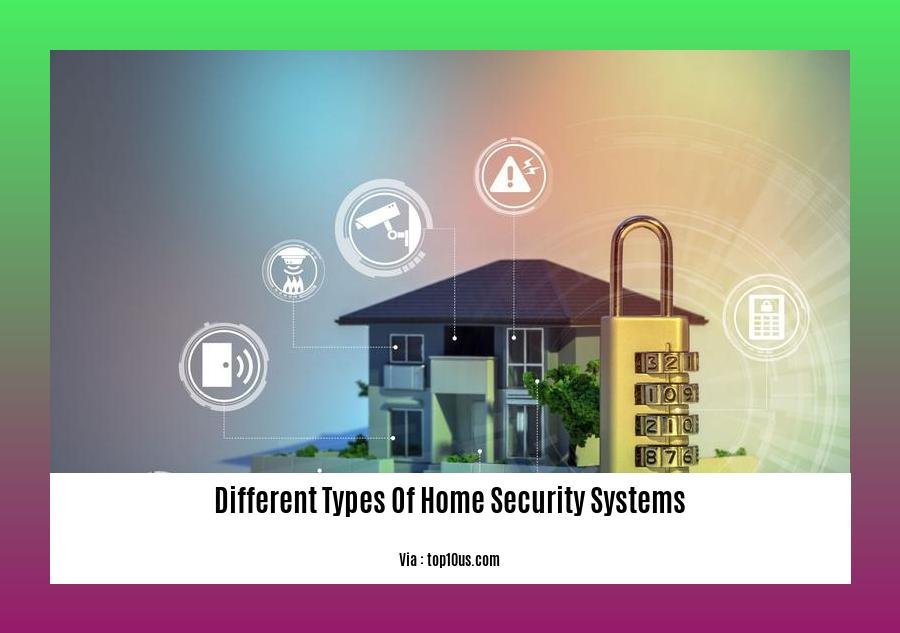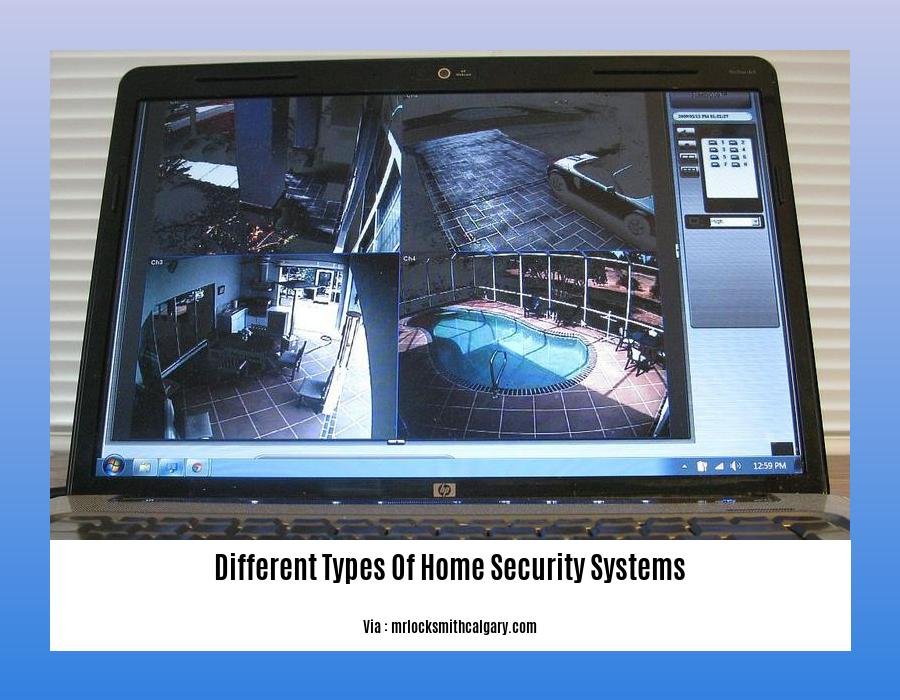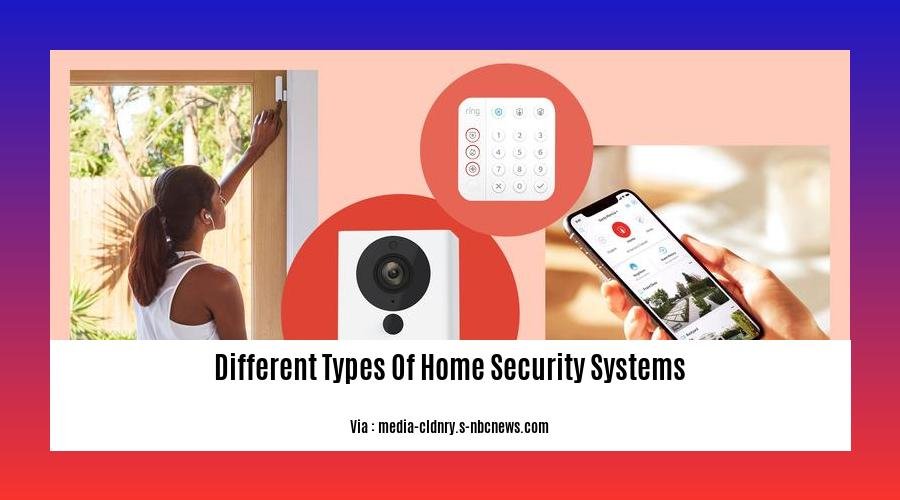Welcome to [- A Comprehensive Guide to Different Types of Home Security Systems: Understanding Your Options]. In this extensive resource, we will delve into the diverse landscape of home security systems, unveiling the intricacies of each type, comparing their features, and empowering you with the knowledge to make informed decisions for safeguarding your home and loved ones.
Key Takeaways:
- Types of Home Security Systems:
- Monitored: Alerts authorities or users in emergencies.
- Unmonitored: Captures footage or includes sensors but no alerts.
- Wired: Uses cables to connect sensors and cameras.
- Wireless: Uses radio or Wi-Fi to connect devices.
- Smart: Includes home automation, monitoring, and app-based controls.
-
DIY: Allows users to customize and install the system themselves.
-
Additional Systems:
- Home automation: Integrates devices via IoT for advanced security.
- Intruder protection: Focuses on detecting and deterring intruders.
- Environmental monitoring: Monitors smoke, carbon monoxide, and flooding.
Different Types of Home Security Systems

Are you seeking a home security system to shield your cherished belongings and offer peace of mind? With the plethora of different types of home security systems available, selecting the ideal one can be daunting. Let’s delve into the primary categories, highlighting their features and suitability for various needs:
Monitored Security Systems:
With monitored security systems, you can rest assured that your home is under constant vigilance. These systems are linked to a central monitoring station staffed by trained professionals who promptly respond to emergencies, dispatching authorities or alerting you directly.
Pros:
- Proactive response to emergencies
- 24/7 monitoring for enhanced protection
Cons:
- Ongoing monitoring fees
- Potential for false alarms
Unmonitored Security Systems:
Unmonitored security systems provide a cost-effective alternative, capturing camera footage and featuring sensors to detect intrusion. While they lack direct monitoring, these systems can still deter crime and provide valuable evidence in case of a break-in.
Pros:
- Lower upfront and ongoing costs
- No contracts or monitoring fees
Cons:
- No immediate response to emergencies
- Requires self-monitoring and response
Wired Security Systems:
Wired security systems offer a reliable connection between devices, ensuring uninterrupted communication. However, professional installation is often required, making them less flexible and potentially more expensive.
Pros:
- Reliable and stable connection
- Less prone to interference
Cons:
- Complex installation process
- Limited flexibility for future expansions
Wireless Security Systems:
Wireless security systems provide greater flexibility and ease of installation, using radio signals or Wi-Fi to connect devices. However, they may be more susceptible to interference and require regular battery maintenance.
Pros:
- Easy installation and relocation
- Wireless connectivity for added flexibility
Cons:
- Potential interference from other wireless devices
- Battery maintenance and replacement
Smart Home Security Systems:
Smart home security systems integrate security features with home automation, environmental monitoring, and app-based controls. These systems offer comprehensive protection and convenience, allowing you to manage security, lighting, and thermostats from a single platform.
Pros:
- Comprehensive security and home automation
- Remote access and control via mobile apps
Cons:
- Higher upfront and ongoing costs
- Potential for security vulnerabilities
DIY Security Systems:
DIY security systems are ideal for those seeking a cost-effective and customizable solution. These systems allow you to select and install components yourself, providing greater flexibility and control over your security setup.
Pros:
- Lower upfront costs
- Greater customization options
- No professional installation fees
Cons:
- Requires technical expertise for proper installation
- Limited warranty and support
Ultimately, the selection of the ideal home security system hinges upon your specific requirements, budget, and technical expertise. Carefully assess your needs, consider the pros and cons of each system type, and seek professional guidance if necessary. With the right security system in place, you can safeguard your home and loved ones, fostering a sense of tranquility and peace.
If you’re in the market for a mobile home, be sure to check out our extensive list of dealers for mobile homes. Here, you’ll find a wealth of information on modular and manufactured homes , including the key differences between modular and mobile homes, and the potential disadvantages of home delivery.
Benefits and drawbacks of each type of system

Navigating the realm of home security can be daunting, given the plethora of options available. Each system boasts unique characteristics, advantages, and disadvantages. Understanding these distinctions is crucial in selecting a system tailored to your specific needs and preferences.
Wired Cameras
Wired cameras provide a rock-solid connection, ensuring uninterrupted surveillance. However, installation can be a hassle, requiring professional expertise and potentially disrupting your home’s aesthetics.
Wireless Cameras
Wireless cameras offer effortless installation and flexibility in placement. However, they may be susceptible to interference, and battery maintenance can be a chore.
Cloud Recording
Cloud recording provides convenient remote access to footage, eliminating the need for local storage. Conversely, it relies on a stable internet connection and may incur ongoing subscription fees.
Digital Video Recorders (DVRs)
DVRs offer local storage of footage, providing more control over your data. However, they require physical access to the storage device and may have limited remote viewing capabilities.
High-Resolution Cameras
High-resolution cameras capture crystal-clear footage, aiding in identification and recognition. However, they consume more storage space and may require a robust internet connection for smooth streaming.
Night Vision Cameras
Night vision cameras pierce through darkness, providing surveillance even in low-light conditions. However, they may produce grainy images in complete darkness.
Motion Detection Cameras
Motion detection cameras trigger recording only when movement is detected, conserving storage space and reducing false alarms. However, they may miss subtle activities and require careful adjustment to avoid false triggers.
Key Takeaways:
- Wired cameras provide a stable connection but require complex installation.
- Wireless cameras offer easy installation but may suffer from interference and battery maintenance issues.
- Cloud recording enables remote access but relies on a stable internet connection and may incur fees.
- DVRs offer local storage but require physical access and may have limited remote viewing capabilities.
- High-resolution cameras capture clear footage but require more storage and a robust internet connection.
- Night vision cameras provide surveillance in low light but may produce grainy images in complete darkness.
- Motion detection cameras conserve storage and reduce false alarms but may miss subtle activities and require careful adjustment.
Choosing the right system for your needs and budget
You want to protect your home and family, but you’re not sure which home security system is right for you. Don’t worry, you’re not alone! Let’s talk about the different types of home security systems and how to choose the one that’s best for you.
There are a lot of different home security systems on the market, so it’s important to do your research before you make a decision. Think about your specific needs and budget. Do you want a system that’s monitored by a professional company? Or would you prefer a self-monitored system? How many cameras do you need? What features are important to you?
Once you’ve answered these questions, you can start narrowing down your options. There are a few different types of home security systems to choose from:
- Wired security systems are the most reliable type of system, but they can be expensive to install.
- Wireless security systems are more affordable and easier to install, but they’re not as reliable as wired systems.
- DIY security systems are the most affordable option, but they require some technical expertise to install.
Key Takeaways:
- Consider your specific needs and budget when choosing a home security system.
- Decide between a wired, wireless, or DIY system.
- Choose a system with features that are important to you, such as motion detection, night vision, and remote access.
- Don’t forget to factor in the cost of installation and monitoring.
- Get quotes from multiple companies before making a decision.
Source: How to Choose the Right Home Security System
Source: A Guide to Choosing the Right Home Security System
Professional installation versus DIY installation
Hey there, folks! So, you’re thinking about upgrading your home security system, huh? Well, you’ve got two main options to consider: Professional installation or DIY installation. Both have their pros and cons, so let’s break ’em down for ya.
Key Takeaways:
- Professional installation:
- Perks: Convenience and customization options, peace of mind with expert setup.
-
Downsides: Typically more expensive, limited DIY flexibility.
-
DIY installation:
- Perks: Cost-effective, greater control over system setup, sense of accomplishment.
- Downsides: Potential for errors, time-consuming, technical skills required.
Choosing the Right Option for You:
-
Consider Your Budget:
Professional installation usually costs more than DIY, but it might be worth it for the convenience and peace of mind. -
Technical Know-How:
If you’re handy and comfortable with DIY projects, you might save some bucks by tackling the installation yourself. Just make sure you do your research and follow the instructions carefully. -
Customization:
Professional installers can tailor the system to your specific needs, offering a wider range of options and ensuring optimal placement of sensors and cameras. -
Warranty and Support:
Many professionally installed systems come with warranties and support plans, providing peace of mind and assistance if issues arise. -
Consider Your Time:
DIY installation can be time-consuming, especially if you’re not familiar with electrical or networking work. If you’re short on time, professional installation might be the better choice. -
Local Regulations:
Check your local regulations to ensure compliance with any legal requirements or building codes that might impact your installation.
Ultimately, the decision between Professional installation versus DIY installation depends on your budget, technical skills, customization needs, and time constraints. Weigh the pros and cons carefully to find the best fit for your home security needs.
Sources:
- DIY Home Security Systems: Pros, Cons, and When to Consider Them
- Professional vs DIY Home Security Systems: Which Is Right for You?
FAQ
Q1: What are the main types of home security systems available?
A1: There are various types of home security systems, including monitored security systems, unmonitored security systems, wired security systems, wireless security systems, smart home security systems, DIY security systems, and home automation systems. Each type offers unique features and benefits, catering to different needs and preferences.
Q2: What are the different recording options for home security cameras?
A2: Home security cameras offer various recording options, including cloud recording and digital video recorders (DVRs). Cloud recording automatically uploads footage to a secure online server, allowing remote access and playback. DVRs capture footage from analog cameras and store it on a local hard drive or other storage device.
Q3: What are some key features to consider when choosing home security cameras?
A3: When selecting home security cameras, consider factors such as resolution, night vision capabilities, and motion detection. Resolution determines the clarity of the captured footage, night vision allows for recording in low-light conditions, and motion detection triggers recording when movement is detected, enhancing security and reducing false alarms.
Q4: How can I choose the best home security system for my needs?
A4: To choose the best home security system, consider your property’s age and condition, evaluate potential vulnerabilities, determine your budget and desired level of security, and decide between professional installation or DIY. Additionally, consider individual components like sensors and smart home devices for added security.
Q5: What are the key differences between DIY and professional home alarm system installation?
A5: DIY installation offers more affordable options and flexibility, allowing you to customize and maintain the system yourself. Professional installation provides convenience and more customization options, often requiring professional monitoring with a contract, resulting in higher costs compared to DIY. Consider your budget, available time, and skill level when making a decision.
- Best Battery Operated Motion Sensor Lights for Every Need (2024) - February 23, 2025
- Bathtub Not Draining? Here’s How to Fix It - February 23, 2025
- Bathrooms with Wall Sconces: Illuminating Style and Function - February 22, 2025










